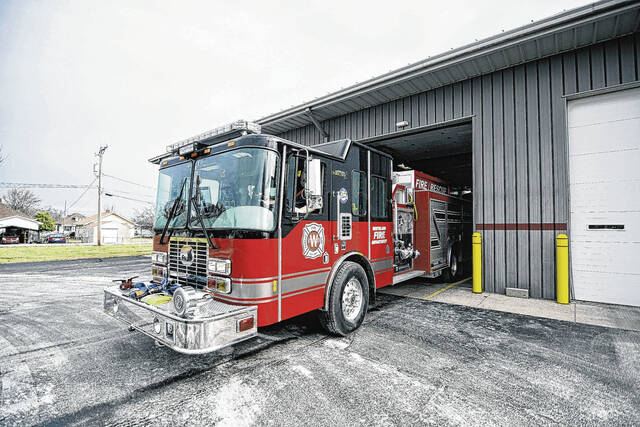Whiteland firefighters and police officers will get a boost from the town’s $1.02 million allocation from the American Rescue Plan Act (ARPA).
ARPA is a $1.9 trillion COVID-19 stimulus package that, among other things, delivered direct relief to Americans and distributed billions to states to respond to the pandemic, and to share with cities, towns and counties to respond to the pandemic.
Indiana officials distributed $1.28 billion to local governments, including $1.02 million to the town of Whiteland. The town has received half of the money and the state is expected to disburse the other half later this spring.
ARPA was passed into law on March 11. Since then, Whiteland officials have been coming up with the best ways to spend the money according to the requirements of the law.
Money can be used for five main purposes including: responding to the COVID-19 public health emergency; responding to negative economic impacts of the emergency; providing premium pay to employees; off-setting lost government revenue; and upgrading water, sewer or broadband infrastructure.
The Whiteland Town Council approved a plan to split the money between the police and fire departments, because both were integral in helping the town respond to the pandemic.
Raising salaries, staffing
The Whiteland Fire Department will use $613,800 to staff three firefighters at the town’s fire station 24/7 at a pay rate of $12 per hour plus payroll expenses for the next three years.
The fire station has had a 24/7 staff of two employees for several years. It was enough to send out an ambulance, but not enough to send a fire engine. So, if a third person wasn’t on-site when the call came in, the crew had to wait on an additional person to report to work before deploying a truck, said Eric Funkhouser, Whiteland fire chief.
Now, the town will always have the ability to deploy a truck at any time, which is expected to improve response times and make the town less reliant on other nearby departments, Funkhouser said.
The $12 wage also represents a pay raise for employees. Currently, firefighters get a stipend based on the state minimum wage of $7.25, which is much lower than what is being offered at other area fire departments, he said.
The new hourly wage is still somewhat low, but is a marked improvement from before, he said.
Nearby departments offer part-time wages ranging from $10 to $18 per hour.
“We are in a wage war with everyone, whether it is EMS or fire. (The) $12 (wage increase) is a huge step in the right direction from where we have been,” Funkhouser said. “Our ultimate goal is to raise that in the future and work our way to a full-time station.”
ARPA funds will cover the changes for three years. That buys Funkhouser and the town council time to find a way to make the changes sustainable in the long-term budget, and look at building on the changes as the town grows, he said.
Until the ARPA funds provided a shortcut, it was a waiting game for tax revenue to increase enough from new businesses and housing to raise wages and increase staffing, Funkhouser said.
The increased wages will allow him to reward long-time staff members and increase the pool of people willing to work for the department. With wage increases at other departments and in the private sector, it has become harder to retain staff, he said.
The payroll changes will take effect Monday, and the new rotation is filling up fast, Funkhouser said this week.
Equipping police officers
The Whiteland Police Department will use $409,200 to buy six police cars, 14 laptops or tablets to be installed in the cars, 15 body-worn cameras, a body-worn camera for the department’s K9 officer, 14 ballistic vests and helmets, 15 tasers and cartridges, up to two drones, four desktop computers and $15,500 worth of miscellaneous supplies.
Much of the funding is being used to upgrade existing equipment that would have taken several years to replace without the extra funds, said Rick Shipp, Whiteland police chief.
“With a small town and a small budget, it is hard to replace all of this at once,” Shipp said. “The American Rescue Plan is really helping us replace this equipment much faster.”
Several items, such as the K9 officer body camera, drones and ballistics gear will be new to the officers.
While Whiteland police have had body-worn cameras since 2012, their K9 has never been equipped. Other officers’ body-worn cameras are 10 years old, Shipp said.
Drones will come in handy for accident investigations and search operations outdoors and inside the large warehouses that are popping up near the Interstate 65 interchange, he said.
Ballistics vests and helmets won’t be for daily wear, but will be kept in police cars if officers are called to respond to a critical incident, Shipp said.
“It will make our officers safer and it will make the town safer. It will give us the opportunity to do more and be more proficient in our response. It also helps us be more transparent,” he said.





